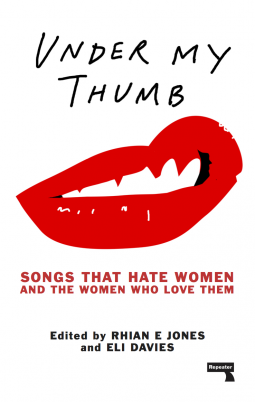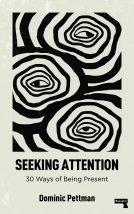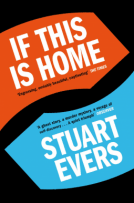
Under My Thumb
Songs That Hate Women and the Women Who Love Them
by Rhian Jones; Eli Davies
This title was previously available on NetGalley and is now archived.
Send NetGalley books directly to your Kindle or Kindle app
1
To read on a Kindle or Kindle app, please add kindle@netgalley.com as an approved email address to receive files in your Amazon account. Click here for step-by-step instructions.
2
Also find your Kindle email address within your Amazon account, and enter it here.
Pub Date 17 Oct 2017 | Archive Date 31 Dec 2017
Repeater Books | Repeater
Description
In the majority of mainstream writing and discussions on music, women appear purely in relation to men as muses, groupies or fangirls, with our own experiences, ideas and arguments dismissed or ignored. But this hasn’t stopped generations of women from loving, being moved by and critically appreciating music, even – and sometimes especially – when we feel we shouldn’t.
Under My Thumb: Songs that Hate Women and the Women Who Love Them is a study of misogyny in music through the eyes of women. It brings together stories from journalists, critics, musicians and fans about artists or songs we love (or used to love) despite their questionable or troubling gender politics, and looks at how these issues interact with race, class and sexuality. As much celebration as critique, this collection explores the joys, tensions, contradictions and complexities of women loving music – however that music may feel about them.
Featuring: murder ballads, country, metal, hip hop, emo, indie, Phil Spector, David Bowie, Guns N’ Roses, 2Pac, the Rolling Stones, Bob Dylan, AC/DC, Elvis Costello, Jarvis Cocker, Kanye West, Swans, Eminem, Jay-Z, Taylor Swift, Combichrist and many more.
Available Editions
| EDITION | Other Format |
| ISBN | 9781910924617 |
| PRICE | US$14.95 (USD) |
| PAGES | 288 |
Featured Reviews
 Reviewer 153322
Reviewer 153322
I heard "Blurred Lines" over the sound system at the grocery store, which effectively muffled everything but the catchy music. Some time later, when I heard the lyrics on the radio, after having the tune in my head for a week, it was gross. Jones here edits a set of essays which wrestle with similar problems--how do/can you enjoy works whose creators are despicable people? what happens when you finally understand lyrics you heard as a kid and they turn out to be demeaning and nasty? what about songs that describe things mainstream at their time, but totally unacceptable now? how does their playing shape public space, like my grocery store? There are no easy answers, but it is satisfying to read other people, especially women, thinking it through.
 Steven P, Reviewer
Steven P, Reviewer
This is interesting and challenging to this reader and i think to many others.
The idea is clever women take songs or artists that they as feminists or just intelligent women (if you dont wish to be identified as a feminist) should like but do and they explain why they do .
The challenging part is the artists selected are not totally obvious for every Rod Stewart there is a Pulp and as a pulp fan i never thought about how say I spy could be considered by a woman . The essays will engage and whilst you may not always agree you will enjoy the argument and may reconsider at a later date.
Very Highly recomended
 David W, Media/Journalist
David W, Media/Journalist
Pop Apologists
Under My Thumb is surprising. I expected an intense feminist screed attacking the whole music industry. But instead it is a thoughtful, personal and extraordinarily well written collection of 29 essays (mostly from the UK and the USA) showing the awesome power of the pop music industry over women. Because all the women who submitted contributions fell under the sway of their favorite singers and bands, and end up defending them, despite the admitted sexism, the overtly offensive lyrics, the misogyny and the violence they preach and perform.
It is very personal and often very deep. There are family situations, teenage angst, class warfare and unattainable aspirations all over these essays. There are extenuating circumstances and rationalizations galore. The authors know full well how obnoxious the singers are, how horrific the lyrics are, and how damaging they can be. One woman wants to protect her ten year old daughter from seeing her favorite band that she herself can never get enough of.
They almost all become apologists for the likes of Kanye, Guns N Roses, Eminem, Tupac, David Bowie, Elvis Costello, Bob Dylan and Mick Jagger. They admit they are actually drawn to murder ballads. “Even when he’s tackling the most reprehensible of topics, I am still desperately, guiltily enthralled” is a very typical admission in Under My Thumb. Many don’t mind memorizing the words of abuse heaped on women. The essays are sharp and well written, analytical, fair, but above all, cathartic.
They are not naïve, either. The authors are mostly academics, 30ish, and freelance writers. At some point in their adolescence, they all came to some variant of the same conclusion: “Men who claim to be down for the cause will merrily sit upon the pedestal you give them, and not knowing or asking how not to, they will continue to hold in place every facet of the system that oppresses you.” A lot of the authors like to say their relationship to the artist/band is “complicated”.
The authors take their favored genre very seriously, assigning all kinds of importance, significance and virtuosity to it, be it death metal, hip-hop or rock’n’roll. To them, the genres showcase enormous talents, are microcosms of society, and demonstrate great depth of feeling and insight. Also astonishing subtlety and nuance. But they’re sexist: blatantly, revoltingly, and humiliatingly. (In the case of death metal, the author has a solution: more women in the bands.)
The irony, if that’s what it is, is that when asked, the musicians all seem to claim the women took it too literally. Like this from AC/DC: “We take the music far more seriously than the lyrics, which are just throwaway lines.” But the pen is mightier than the sword, and the harm done is simply beyond the comprehension of these musical geniuses. The essay authors are torn.
The essays seem to be blind contributions; there are no references to each other. Had they seen each other’s work, perhaps they wouldn’t be so repetitive. But the near unanimity of it all is striking by itself. It comes from many angles, and ends in doubt, which is far too charitable an outcome.
David Wineberg
 Bunny C, Reviewer
Bunny C, Reviewer
Your fave is problematic.
Your favorite movie. Your favorite TV show. Your favorite author. Your favorite musician. Your fave is problematic. You should definitely stop liking them.
This is a common refrain on the internet. This 'problematic fave' meme has gotten to the point where it's more a joke than anything, something someone rolls their eyes at and keeps moving. Because our faves are our faves, problematic or not. And we're not interested in someone who isn't a die hard fan telling us why our beloved show, our beloved book, the song we listened to on repeat during our misspent youth, makes us bad people with no sense of the realities of this world.
And this is a problem. Because these things need to be talked about. We, the fans of Joss Whedon, the fans of Johnny Depp, the fans of Eminem, the fans of The Rolling Stones and Kanye West and yes, Taylor Swift. We need to be aware that our faves need to be held accountable for their actions, for their words, for their inaction.
This book is not about how your faves are problematic and you should hate them. This collection of essays, written by a diverse and talented group of women, is about how your faves are problematic and it is okay that you still love them.
That is the most important take away from this wonderful collection of essays on the intense problem in this variety of musical genres with the degrading and devaluing of women. It would have been very easy to have this book focus on the obvious genres. Hip hop, classic rock. But we also have classic country, emo, heavy metal, goth industrial*. These essays are in chronological order based on when the music was released, meaning the first chapter references Dion and the Belmonts (didn't see that coming, did you?).
This is exactly what is needed in any discussion of problematic faves. This isn't a bunch of old people screaming about the "kids today and their music." These are Guns n Roses fans talking about 'You're Crazy'. These are Tupac fans talking about "Wonda Why They Call U Bitch". These are the voices needed in any talks of misogyny and the problems with normalizing it in any form of art. The problem with letting the harsh words go in one ear and out the other, the problem with being okay with this treatment because "those women" being talked about are bitches, are sluts, you're not like them, it's okay because it's not about you.
These authors aren't telling you to hate these artists. They're telling you they love them, too, but that these problems need to be addressed. Love the artist, but expect better from them, and future artists in the genres we love.
* Didn't even know this was a thing. Learned so much from this book.
Readers who liked this book also liked:
Dominic Pettman
Health, Mind & Body, Nonfiction (Adult), Politics & Current Affairs





